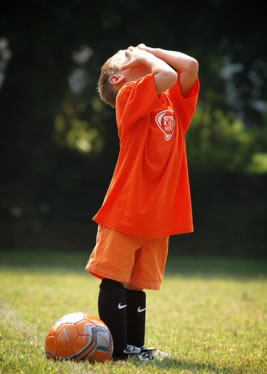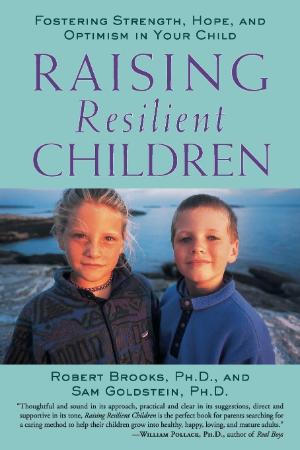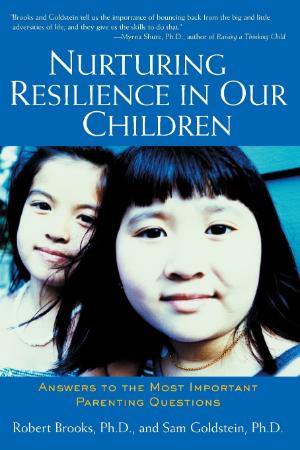
Resilience is usually defined as the capacity to handle adverse experiences constructively, to recover from them, and to integrate them in a way that allows the person to find growth and meaning as they move forward in life.
So while it's natural for children to experience big feelings on a daily basis, including "negative" feelings such as disappointment, grief and anger, children who are more resilient are able to recover more quickly from those experiences. In fact, they often learn and grow from those setbacks, gaining confidence and resourcefulness.
And here's the really good news. You, the parent, can make a tremendous difference in your child's ability to adjust to the normal disappointments of life, to gain more flexibility and resilience when things aren't going their way.
A large body of research on resilience has found that:
- Genetics (such as tendency to anxiety) influences resilience.
- The most significant factor in a child's development of resilience is the parent-child relationship, which can help children develop a lifelong sense of safety and a nervous system that recovers from stress more quickly.
- Although everyone is born with a different innate tendency toward more or less resilience, anyone can learn the skills to become more resilient.
There's a common misconception that children develop resilience by failing. Actually, children develop resilience by dealing successfully with failure.
When children have the support to get up and try again, they learn they can survive adversity and come out okay. When a child doesn't have that support, all he learns from failing is that he's the kind of person who fails.
So what kind of support can help your child turn failure into the confidence that no matter what happens, she can handle it?
1. The experience of feeling safe, cared for, and understood -- even when things go wrong.
The security of knowing that someone is watching out for him is what allows a child to explore, to risk bumps, disappointment and hurt feelings, and to come out the other side. When children feel safe, they develop a nervous system that is less alarmist, so they recover more easily from upsets.
So don't try to talk her out of her feelings when she doesn't get the part in the play. Instead, empathize with her disappointment and honor her grief. With your support, she'll feel those big emotions and move past them, instead of freezing them inside, which locks in that feeling of failure. She learns from experience that she can tolerate any emotion she feels and come out the other side, and the sun will come up the next day.
2. The experience of solving problems.
Every child faces problems every day. Hopefully, working through those problems will give your child the confidence to face the even tougher challenges in his future. So when your child encounters a challenge, he needs to know that you've got his back.
But your job isn't to solve the problem. It's to support your child so that he feels empowered to tackle the challenge himself.
If you lecture, teach or solve the problem for her, you're teaching her that she can't solve things herself. Your goal isn't just to solve the problem, but to support your child to feel more capable by giving backup, so that she can successfully handle the challenge. In the future, she'll have more confidence when she hits a roadblock, because she thinks of herself as someone who can solve the problems she encounters.
So when your child gets into a jam, manage your own anxiety and resist jumping in to rescue. Instead, support him to brainstorm possible solutions and their outcomes. "Hmm... yes, you could do that. I wonder what might happen then?"
3. The experience of "Yet."
What happens when your child gets frustrated at failure, or that they aren't good at something? You empower them with the word "YET."
4. The experience of encountering difficult emotions and learning to manage them constructively.
Resilience depends on being able to handle negative emotions. It's natural that when young children feel overwhelmed by their emotions, they crumble. But as kids get older, they can develop enough emotional regulation to tolerate the disappointment of losing, or the frustration of practicing as they master their craft. They recover more quickly from upsets. They're more likely to re-apply themselves, and to keep trying when things are hard.
How can you help your child develop emotional regulation? That's what this whole website is about. But the most important parenting strategy is to accept and allow all emotions, even when you need to limit behavior.
5. The experience of mastery.
Developing grit--that quality of pushing through obstacles as we pursue something about which we're passionate--depends on the child working hard to accomplish her own goals, whether that's mastering a jump shot, short story, recipe or camping trip. Notice that the motivation comes from within, not to please us, so it has to be the child's own interest. Make sure that your child gets plenty of time to initiate and pursue his own passions, which isn't always easy in this age of homework and screen time.
Knowing that someone cares, and is there to help him pick up the pieces, is the foundation of resilience. You can't protect your child from the rain that falls in every life. What you can do is make sure that he knows how to find an umbrella, and has the confidence to make it through the storm. To teach him that, you don't withhold the umbrella and make him stand out in the rain. You provide backup, coaching him repeatedly so he learns how to find or build an umbrella and has the emotional strength to do that, even when the rain pours down.
Now's the time to start practicing. Some day, your child will look back and remember that he's dealt with hard times before, and he came out fine. It's your unwavering love that will get him there.
***
"Where does resilience come from?... It comes from knowing that you never have to be alone… If you feel connected, you will always be able to deal with adversity. The skills we need to deal with adversity begin with a feeling of 'I can handle this.' It is a feeling of 'No matter what happens, I can find a solution'; a feeling of 'I have dealt with hard times and come out fine before'; a feeling of 'Even when I feel lost, I always have somewhere to turn.'” – Dr. Edward Hallowell
What does a resilient person look like?
Resiliency is actually a constellation of traits that work together. Self-esteem, perseverance, optimism, competence, responsibility, and emotional intelligence are arguably the most important. Each of these traits has its own section on this site.
One large study found that highly resilient people share certain positive characteristics. They:
- Are more likely to accept what they cannot change while still working to change what they can.
- Are guided by an inner compass and sense of meaning or purpose.
- Are more likely to be optimistic, choosing to look for silver linings.
- Are connected to others, both offering and receiving support,
- Are more likely to have a spiritual or religious practice in which they find meaning.
Notice that these qualities are choices. The more we model these characteristics in our own lives, the more our children will learn them as a way of life.
Why is resilience a critical quality to develop in your child?
Because a resilient child will become a happy adult. Resiliency is the ability to rise above adversity. Overcoming the challenges with which the world inevitably blocks our way.
Making lemonade from lemons, if necessary, and making the most of ourselves and the life we are given. Using the hardships of life as lessons from which to learn about ourselves, and to grow.
All children face adversity of some sort in their journey to adulthood, so resiliency is a prerequisite for healthy growth. By helping your children to develop resiliency, you vaccinate them against future difficulties.
Is there a recipe for resiliency? We know that many traits that contribute to resiliency are at least partially inherited. Children who are by nature more adaptable, more outgoing, and more emotionally even keeled have a head-start in developing resilience. We have even identified specific genes that seem to confer some degree of resilience, such as 5HTT, which influences serotonin, and OPRM1, which promotes attachment.
But what our children really experience is always the interaction between genetics and environment. Regardless of your child's genetic make-up, you can give her a foundation of resiliency with her early experiences, such as healthy attachment bonding and positive interactions with adults that help the child develop an unshakable belief that the world is a friendly place that welcomes and assists them.
Many studies on children who survive adversity despite inadequate parenting have found that these kids had someone -- a teacher, a coach, a grandmother – who believed in them 100% and gave them nurturing and encouragement from which they could springboard. The question is, how are these youngsters able to patch together the little bits of love they are resourceful enough to find into enough of a security blanket to keep growing?
The answer, most researchers suggest, lies in their earliest relationships. Those with enough positive parenting, where they felt loved and valued, are able to use that to build on throughout life, even if their later building materials are scant. Every child needs to know that someone is in their corner, rooting for them. From that experience they internalize a sense of their own value and potential that cheers them on even when times are rough. What's more, it allows them to find and use support from outside, in the form of encouraging adults who help them along their path.
Sensitive parenting can even modify the way our children's inherited tendencies are expressed. One striking study suggested that shy children who receive excellent parenting are able to use their heightened sensitivity to others to become leaders, while shy children who are poorly parented may find that their shyness becomes insecurity which plagues them throughout their lives. Genetic make-up may be critical, but only when combined with environment is it destiny.
Photo Credit: Thank you to Crushed Red Pepper
Recommended Resources
PLEASE NOTE: These books are Amazon links with photos of the books. If you are not seeing them on your page, it may be that your browser is not picking them up, or Ad Blocker in Chrome is blocking the Amazon links. You can disable Ad Blocker just for this site if you like. Or you may want to try another browser. Enjoy!








